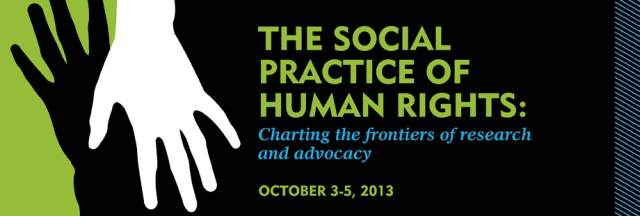Struggling to Define the Right to Education
Location
River Campus - Room M2265
Start Date
10-4-2013 9:30 AM
Abstract
Although the discourse of human rights has been widely adopted, the philosophical foundations of human rights are often contested. This paper attempts to build upon recognition theory and Christof Heyns’ struggle approach to human rights to argue that concrete human struggles can be used to define and realize universal rights. We can know which rights are legitimate by looking at the legitimate struggles of oppressed people throughout history. Such an analysis provides an empirical method for grounding abstract conceptions of universal rights.
Over the past two decades, human rights advocates have increasingly turned to quantitative indicators for evidence of human rights violations. But the struggle approach reminds us to proceed humbly, recognizing that people should remain at the center of human rights theory. The right to education provides a useful example. It is fairly easy to say that the right to education requires universal access to education that aims to develop tolerant, participatory citizens to their full potential, but there is no consensus on how to accomplish or assess these goals. We can better advance these concepts by considering the input of those struggling for their right to education. How does a community define a well-educated person? What kind of education do community members want for their children? Local conceptions of education matter. Critical qualitative research methods can be used to communicate local educational assessments to the international community. These local voices are necessary to dialectically develop the universal right to education.
Struggling to Define the Right to Education
River Campus - Room M2265
Although the discourse of human rights has been widely adopted, the philosophical foundations of human rights are often contested. This paper attempts to build upon recognition theory and Christof Heyns’ struggle approach to human rights to argue that concrete human struggles can be used to define and realize universal rights. We can know which rights are legitimate by looking at the legitimate struggles of oppressed people throughout history. Such an analysis provides an empirical method for grounding abstract conceptions of universal rights.
Over the past two decades, human rights advocates have increasingly turned to quantitative indicators for evidence of human rights violations. But the struggle approach reminds us to proceed humbly, recognizing that people should remain at the center of human rights theory. The right to education provides a useful example. It is fairly easy to say that the right to education requires universal access to education that aims to develop tolerant, participatory citizens to their full potential, but there is no consensus on how to accomplish or assess these goals. We can better advance these concepts by considering the input of those struggling for their right to education. How does a community define a well-educated person? What kind of education do community members want for their children? Local conceptions of education matter. Critical qualitative research methods can be used to communicate local educational assessments to the international community. These local voices are necessary to dialectically develop the universal right to education.




Comments
This biennial conference provides a unique space for scholars, practitioners and advocates to engage in collaboration, dialogue and critical analysis of human rights advocacy — locally and globally. Learn more about the Human Rights Center at the University of Dayton >>>.